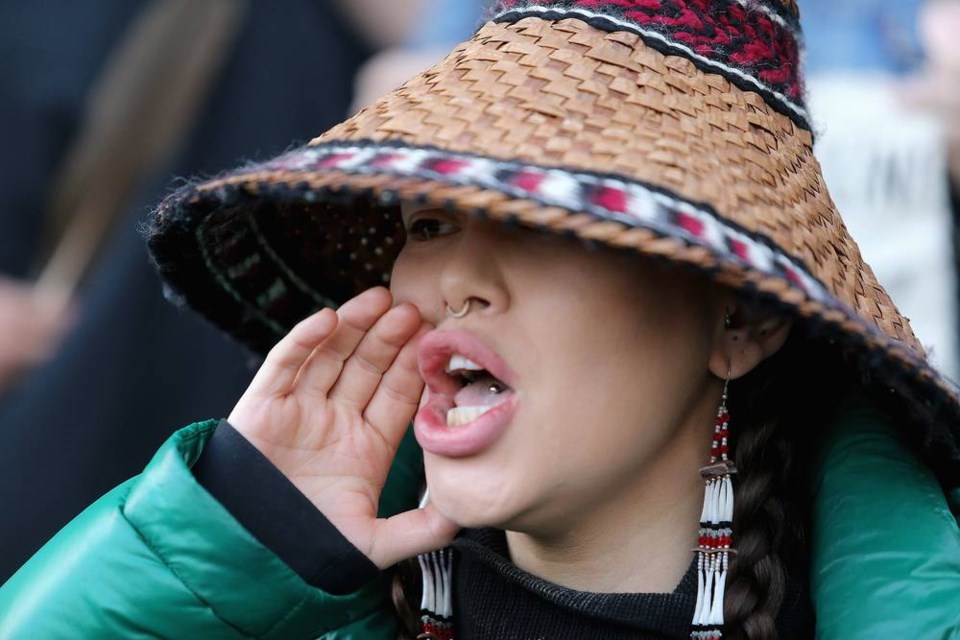A commentary by a member of the W̱SÁNEĆ People who has spent his career in various aspects of First Nations community development in the South Island. He works as a language revitalization coach at First Peoples Cultural Council in Brentwood Bay, but these words should not be construed as the opinions of his employer.
Re: “Indigenous place names should be rendered in easily pronounced form,” commentary, June 19.
As a scholar of the English language, the writer of the commentary is aware that the English language is a monster and literally consumed other languages as it spread across the globe.
As a learned individual, to still use the term Saanich while knowing we are the W̱SÁNEĆ is a bit disheartening, and by implying Indigenous words/places names need to be anglicized to be more pronounceable, confirms and shows naïveté or an entrenched colonial mindset. By the tone of the letter, I believe it to be the former.
Most Indigenous people already carry the burden of learning and using English instead of their own language. The dilution of our already diminishing languages will make them less like ours with the proposed suggestion. We already have that with many towns, cities and other locations on Vancouver Island with anglicized names, as his examples have shown.
Our languages connect us to our lands and our cultures; to add English variants and have two versions of the same will begin assimilating our languages into the greater one, and we know how that will end. Recent events demonstrate that this is the path the colonials took to overcome our lands as well.
I propose British Columbians, and Canadians for that matter, learn the original pronunciation for a few reasons: First, so that a personal connection can be made to local Indigenous communities and its people; second, by virtue of learning and knowing the original name, one can learn the meaning and history of a place; and third, because that is the name and should be pronounced properly out of respect, even if it is challenging at first.
I realize learning these names may not catch on with the older generations, but as younger generations hear and learn proper pronunciation, it will with them.
A quick Google search on early childhood language learning will show young people learn language better than older folks. This will thereby set the stage for our kids and grandchildren to become closer and have a better understanding of the differing worldviews.
Learning the local languages will not be restricted to just non-Indigenous people, though. In many cases, young Indigenous learners will be learning proper pronunciation for the first time as well.
According to the First Peoples Cultural Council’s Report on the Status of B.C. First Nations Languages 2018 (available at fpcc.ca), of the reporting Nations only three per cent of B.C.’s Indigenous people speak their mother tongue fluently or are first language speakers.
The flip side to the serious decline of first language speakers, according to the same document, is the increase in learners and speakers and numbers are steadily increasing. ȽÁU, WELṈEW̱ School and the SENĆOŦEN language in W̱SÁNEĆ is an excellent example of the growth and resurrection of language.
As a W̱SÁNEĆ person who is language-aware but not fluent, my goal is to use SENĆOŦEN if I can, even in public so it can be heard and acknowledged.
Directly responding to his worry of not knowing how to pronounce our words, two places he can look to find the appropriate pronunciation and spelling is at the aforementioned First Peoples’ Cultural Council’s newly introduced B.C. First Nations Language Map, where one can learn local place names, hear audio and see the spelling of the 34 languages and 93 dialects in B.C. It is at maps.fpcc.ca.
In addition, FirstVoices.com can be accessed for a multitude of languages with audio examples from across the province so that one can practise and fine-tune their ear and tongue to say it properly. Links and information are also available there to help with downloading the appropriate fonts for a specific orthography.
Lastly, in the commentary it was suggested anglicized Indigenous place names would not replace or stop actual place names’ usage. I suggest otherwise. An excellent example is the commonly used descriptor “Salish”; this word demonstrates what could happen if word introductions or changes are left to the dominant language practitioners.
It is easy to say and spell. Most will also think this is an appropriate name for the body of water between Vancouver Island and the mainland because Indigenous tribes in southern B.C. and Washington state are recognized as Coast or Interior Salish People.
We all have been designated by that name since early colonial contact by anthropologists and linguists as they moved westward. The affected First Nations have been called by that name so much and for so long most have accepted it as correct.
I even learned about this when I was a young boy during the 1970s in Grade 7 social studies. (My very traditional and old-school mom corrected me because she never heard the word before.)
But if you were to research into who the Salish people really are and where they live, you will learn they can be found in Montana as the Kalispel people.
So, this brings us back to what continues to happen with our disappearing languages; it becomes commonplace to use the easier pronunciation without thought to the consequences. The irony of it is we have multiple distinct Nations and a prominent body of water named after a people a thousand kilometres away.



